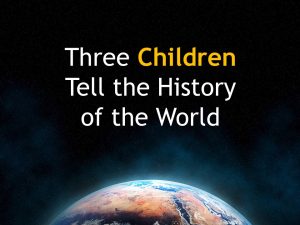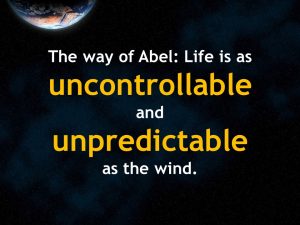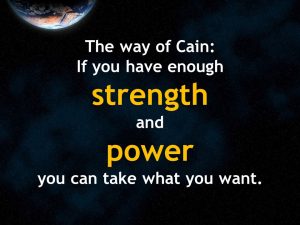 Names are important. My middle name is “Curry,” which makes most people think about spicy Indian food. It makes me think about my Grandad. It was his name. It is a name that calls me to live up to his work ethic, warmth and faith.
Names are important. My middle name is “Curry,” which makes most people think about spicy Indian food. It makes me think about my Grandad. It was his name. It is a name that calls me to live up to his work ethic, warmth and faith.
Names are also important in the opening pages of Genesis. Lands, rivers, trees and animals are all given names. God names humanity “Adam” for they came from the “ground, dust” (Gen. 5:1-2; 2:7 ground=adam). Adam names his wife “woman” for she was taken out of man (Gen. 2:23). Later the woman is named “Eve,” for she was the mother of all the living (Gen. 3:20).
The reader of Genesis is trained early on to listen for names and understand their significance. So, when Adam and Eve have three sons we are not surprised that their names mean something. In fact, the names they were given and the lives they lived foretold the history of the world.
 Abel – The Futility of Life
Abel – The Futility of Life
Adam and Eve’s second child was named, “Abel.” Abel never has a line of dialogue. His actions take place off stage. We are quickly told he kept sheep, and offered the first and best of his flock to the Lord. As a result, “The Lord looked with favor on Abel” (Gen. 4:4). Abel was a hard-working, godly man.
Yet, his brother Cain, in a fit of jealousy, “attacked his brother Abel and killed him” (Gen. 4:8). As quickly as we hear about Abel he is gone. Never hardly seen and never heard. Precious to God, yet snuffed out by man.
The reader of Abel’s story is left with an empty feeling of frustration. Good guys don’t win. They get struck down.
No wonder his name is “Abel,” which is the Hebrew word “Hebel,” meaning, “breath, vapor, wind.” It is a word picture for human life. Life is as fleeting as it is incomprehensible. How can a good man so tragically and quickly die? Life is as uncontrollable and unpredictable as the wind. Life is Abel.
This is why the author of Ecclesiastes uses Abel’s name 37 times to describe the nature of life (translated as, “vanity” or “meaningless” see Eccl. 8:14). Understanding and controlling life is like trying to shepherd the wind—an impossible task. At the end of the day “our projects are cloud castles on a windy day” (Leithhart, Solomon Among the Post-moderns. p. 68).
Abel’s story leaves the reader of Genesis with an unsettling reality. You can work hard and serve God, but things will happen in life that you can’t control and you won’t understand. Even the godly seem to come to nothing.
 Cain – The Possessor of Life
Cain – The Possessor of Life
Perhaps the way of Cain is better. Adam and Eve named their first child, “Cain,” which means “to possess, or acquire.” God promised the couple that they would have a child who would destroy the power of the devil (Gen. 3:15). It is possible the new parents thought, “We’ve got him!” Yet, it is tragically ironic that Cain did not defeat the devil, but became the devil’s prey and then his finest tool (Gen. 4:7).
It is more likely that the name “Cain” described his character. Cain is the one with all the possessions (Gen. 4:10-24)! When his brother’s life gets in his way, he takes it. Cain teaches us, if you have enough strength and power you can take what you want. While Cain is cursed for his actions, he also receives the special protection of God. In addition, Cain acquires a land, a wife, then a son, and finally a city.
Cain chose to be his own boss; call his own shots—and it worked! You can live a meaningful life independently of God. Rebellion against God is fulfilling. Those who live like Cain possess the world! The reader of Genesis gets to the end of chapter 4 and says, “Cain wins!”
Oops, but the next event in Genesis is the Flood (Gen. 6:1-ff). Every single one of Cain’s descendants come to nothing (Abel-hebel)! All their families, cities, and works wiped away in the waters of God’s judgment. For a while, it looks like Cain wins, but he ends up just as dead as Abel.
 Seth – The “Gift” of God
Seth – The “Gift” of God
Then we meet Adam and Eve’s third child, “Seth.” Adam defines his name by saying, “God has granted me another child in the place of Abel” (Gen. 4:25). Seth is a “gift from God,” as a “substitute” for his fallen brother.
With the birth of Seth and his children, “people began to call on the name of the Lord” (Gen. 4:26). A new, third choice emerges. Not the way of Abel, or Cain, but the way of Seth…God’s gift, God’s substitute for what sin killed. The image of God would live on, not through Cain, but through Seth.
When the flood of God’s judgment came only the family of Seth survived. Seth had a descendant named Noah. Through Noah God preserved a righteous few from His judgment on sin. God didn’t have to do this. It was His gift, His grace, to save the sinful race through one of Seth’s sons.
Your Life
Adam and Eve’s children illustrate the history of life on this planet. At times, it is frustratingly perplexing, so most people gobble up all the goodies they can, but ultimately God’s grace is the only way to survive.
Don’t be discouraged when life doesn’t make sense. Yes, sometimes good people like Abel die, and selfish people like Cain succeed. So, accept life for what it is, not what you wish it to be. Know that while Abel had no dialogue in Genesis, he speaks today saying, “God is pleased with the faithful” (Heb. 11:4, 6).
Don’t be deceived into thinking that life is about the things you possess (Luke 12:15). Yes, the way of Cain has the smell of success, but in the end every prized possession and every selfish ambition is wiped away into eternal emptiness.
Be thankful God provided a substitute for the people sin has killed—Jesus Christ. The only way out of this world is through Him. Are you in His family?
Tim Jennings
timj.theway@hotmail.com
“Let all that you do be done in love.” (1 Cor. 16:14)
Extra Bits:
Sin Goes from Bad to Worse
The story of Adam and Eve’s three sons also warn us against the path of sin, because it will go from bad to worse. We think we can dabble in sin and it won’t hurt those who come after. Adam’s family shows that not to be the case.
- When Adam sinned in Genesis 3 it was selfish, but it was also passive. He took and ate. When Adam and Eve learned of their sin they felt shame.
- However, when Cain sinned, it was not so passive. It was active, it was an attack. While Adam and Eve tossed accusations around, Cain tossed his brother around till he died. The sin in the parents grew in the son.
- Then the violent, selfish attack of Cain is intensified in his son Lamech. If Cain took seven lives, his son would take 77 lives.
- This violent, selfish, power-play of Cain’s way finds its full expression in the days of Noah when Cain’s decedents became “greatly wicked, and every inclination of their thoughts of their heart was only evil all the time” (6:5).
- The path of Cain seems to work for a time. Intellect, power, human ambition and production seem to rule the earth. But it creates a society of selfish, sinful people. Those seeds of sin will grow and reap a harvest of worse sin, until God reaps the wicked in His judgment.
Don’t play with sin, it goes from bad to worse.
Further Exploration
Cain, Abel and Seth reveal fundamental lies and truths about life. The author of Ecclesiastes also wrestles with the nature of human life. Therefore, the Bible student finds many parallels between the arguments of Ecclesiastes and the opening pages of Genesis. For example, Ellen van Wolde wrote,
“The story of Cain, Abel and Seth in Genesis 4 presents an account of how harmony and happiness were transformed into absurdity, meaninglessness, and pessimism. The book of Ecclesiastes develops a similar idea by attempting to answer the riddle of human existence” (The Story of Cain and Abel: A Narrative Study. JSOT 52:29)
The following articles were helpful to me in seeing the connection between Ecclesiastes and Genesis 1-11, and they helped form some of the thoughts presented more simplistically in the article above.
Koheleth’s Use of Genesis, by Charles Forman (Journal of Semitic Studies, Vol. 5, Issue 3, 256-263)
Cain, Abel, Seth, and the Meaning of Human Life as Portrayed in the Book of Genesis and Ecclesiastes, by Radisa Antic (Andrews University Seminary Studies, Vol. 44, No2, 203-211)
The Story of Cain and Abel: A Narrative Study. by Ellen van Wolde JSOT. Vol. 16, Issue 52, 1991)
You can also download my introduction on Ecclesiastes which contains similar material at these links:
Introduction to Ecclesiastes (Tim Jennings) – Word Document
Introduction to Ecclesiastes (Tim Jennings) – PDF

